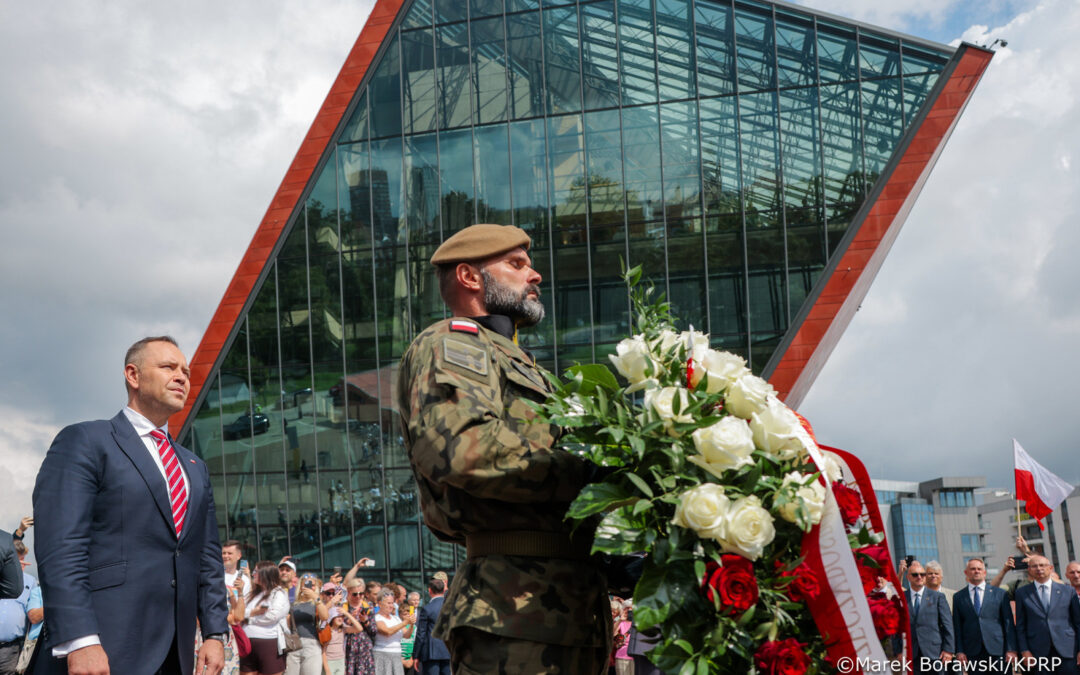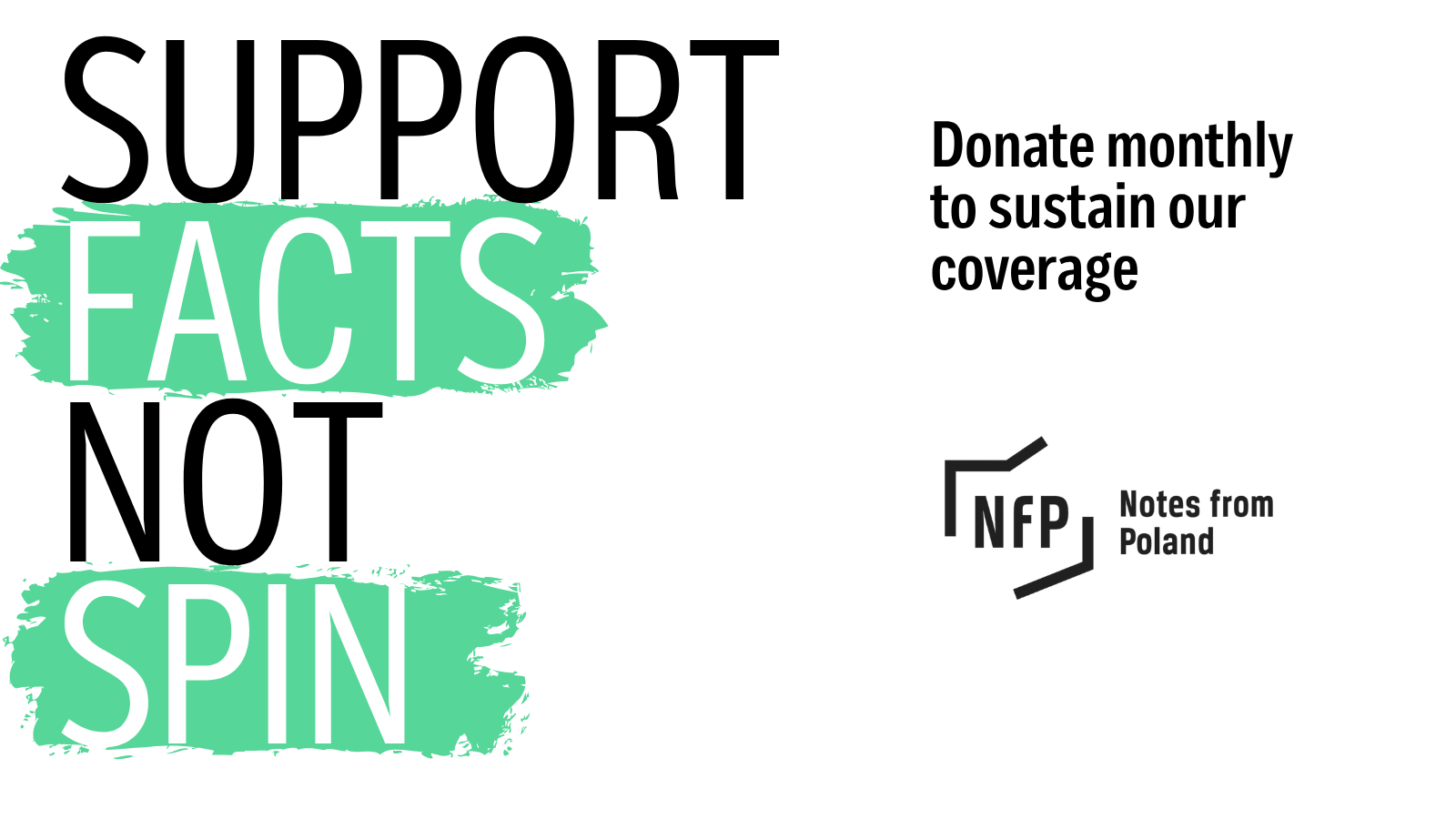Keep our news free from ads and paywalls by making a donation to support our work!

Notes from Poland is run by a small editorial team and is published by an independent, non-profit foundation that is funded through donations from our readers. We cannot do what we do without your support.
President Karol Nawrocki has created the new position of “ambassador for historical diplomacy”, which will deal with issues in international relations relating to history.
Nawrocki, a historian who served as head of the Institute of National Remembrance (IPN) before becoming president, has placed great emphasis on “historical policy”, both in domestic and foreign affairs.
That has so far included demanding reparations from Germany for World War Two and opposing Ukraine’s desired membership of NATO and EU until the question of wartime massacres of ethnic Poles by Ukrainian nationalists is resolved.
Postanowieniem z dnia 28 października 2025 r. Prezydent RP @NawrockiKn powołał z dniem 29 października 2025 r. dr hab. Grzegorza Berendta na Ambasadora – specjalnego przedstawiciela Prezydenta Rzeczypospolitej Polskiej do spraw dyplomacji historycznej.https://t.co/ljyV2Ou8gU pic.twitter.com/aaGSHAG53p
— Kancelaria Prezydenta RP (@prezydentpl) October 29, 2025
At a ceremony on Wednesday, Nawrocki appointed Grzegorz Berendt to the position of “ambassador [serving as] special representative of the president for historical diplomacy”.
In its announcement, the president’s chancellery did not specify what Berendt’s role would involve. But spokesman Rafał Leśkiewicz later told the Polish Press Agency (PAP) that “his activities will focus on historical topics important to the state, its politics, and diplomacy from a historical perspective”.
Leśkiewicz also clarified that, though holding the title of ambassador, Berendt would not be part of the foreign service, which is under the purview of the foreign ministry, but would instead report to the president. He would also not be paid for his role.
Nawrocki is able to create such positions under a law introduced in 2021 that empowers the president to appoint his own ambassadors to carry out specific foreign-policy tasks. The power was first used in 2023 by then-President Andrzej Duda.
Berendt is a historian who was Nawrocki’s PhD supervisor when the latter wrote his doctorate at the University of Gdańsk. In 2021, Berendt was appointed director of the Museum of the Second World War in Gdańsk – taking over the position from Nawrocki, who had just been made head of the IPN.
Both men obtained their positions leading those state historical bodies when the national-conservative Law and Justice (PiS) party was in power. After PiS was replaced by the current, more liberal government in 2023, Berendt was dismissed as director of the war museum.
Nawrocki remained at the head of the IPN until this year, when he stood as a nominally independent but PiS-backed candidate for the presidency, eventually winning against government-backed candidate Rafał Trzaskowski.
Historical issues played an important part in Nawrocki’s campaign, as well as in the early stages of his presidency. On the anniversary of the outbreak of World War Two, Nawrocki, already president, called for Germany to pay reparations to Poland for its brutal invasion and occupation.
He repeated those demands during a visit to Berlin two weeks later. In response, German leaders reiterated their longstanding position that they consider the issue legally closed and that no reparations are owed.
Polish President @NawrockiKn has called on Germany to pay Poland war reparations during talks in Berlin with Chancellor @_FriedrichMerz.
In response, Germany has reiterated that it considers the issue to be legally closed and that no reparations are owed https://t.co/sX07qtCFRL
— Notes from Poland 🇵🇱 (@notesfrompoland) September 16, 2025
Meanwhile, while standing for the presidency, Nawrocki declared that he “does not envision” approving Ukraine’s bids to join the EU and NATO “until important civilisational issues for Poland are resolved”.
That was a reference to the lingering legacy of the Volhynia massacres, in which Ukrainian nationalists killed around 100,000 ethnic Polish civilians during World War Two. Poland regards the episode as a genocide, but Ukraine has rejected that characterisation and honours some of the nationalist leaders as heroes.
“A country that is not able to account for a very brutal crime against 120,000 of its neighbours cannot be part of international alliances,” said Nawrocki, who, as head of the IPN, pushed for Ukraine to allow the exhumation of the remains of victims buried in unmarked mass graves.
After winning the presidential election, Nawrocki submitted a bill to parliament that would criminalise the promotion of ideologies associated with the historical Ukrainian nationalist groups responsible for the massacres, placing them alongside Nazism and communism as banned dogmas.
That prompted an angry response from Kyiv, which warned that, if the bill is passed, it “will be forced to take retaliatory measures”.
Ukraine has criticised a law proposed by Poland's president that would criminalise promotion of historical Ukrainian nationalist ideologies, equating them with Nazism and communism
It warns of "retaliatory measures" if the bill is passed https://t.co/TaX2Vj5z8v
— Notes from Poland 🇵🇱 (@notesfrompoland) October 2, 2025
Since becoming president in early August, Nawrocki has not met with his Ukrainian counterpart, Volodymyr Zelensky, who enjoyed extremely close relations with former Polish President Andrzej Duda (including jointly commemorating the Volhynia massacres).
Asked last week about why Nawrocki had not yet visited Kyiv, his chief foreign policy aide, Marcin Przydacz, told the Gazeta Wyborcza daily that a major reason was Kyiv’s “disappointing behaviour” in relation to resolving historical issues.
Przydacz said that, although Ukraine finally approved exhumations of massacre victims this year, the pace has been too slow. One exhumation has already been completed and a second approved.
This week, Leśkiewicz said that Zelensky was welcome to visit Nawrocki in Warsaw and “discuss important matters…such as the exhumation in Volhynia and the lack of consent for further search and exhumation work”.
Ukraine has approved further exhumations of Poles massacred by Ukrainian nationalists in WWII.
It is the second time this year that Kyiv has granted permission for exhumations, which were banned until a recent diplomatic breakthrough with Poland https://t.co/ifsrgedtIE
— Notes from Poland 🇵🇱 (@notesfrompoland) October 14, 2025

Notes from Poland is run by a small editorial team and published by an independent, non-profit foundation that is funded through donations from our readers. We cannot do what we do without your support.
Main image credit: Marek Borawski/KPRP

Daniel Tilles is editor-in-chief of Notes from Poland. He has written on Polish affairs for a wide range of publications, including Foreign Policy, POLITICO Europe, EUobserver and Dziennik Gazeta Prawna.




















